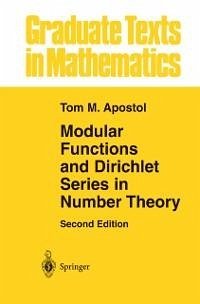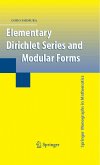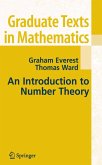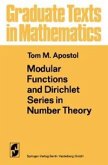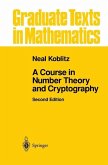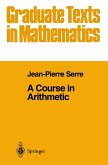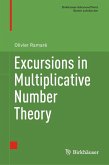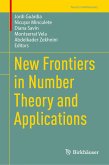Tom M. Apostol
Modular Functions and Dirichlet Series in Number Theory (eBook, PDF)
48,95 €
48,95 €
inkl. MwSt.
Sofort per Download lieferbar

24 °P sammeln
48,95 €
Als Download kaufen

48,95 €
inkl. MwSt.
Sofort per Download lieferbar

24 °P sammeln
Jetzt verschenken
Alle Infos zum eBook verschenken
48,95 €
inkl. MwSt.
Sofort per Download lieferbar
Alle Infos zum eBook verschenken

24 °P sammeln
Tom M. Apostol
Modular Functions and Dirichlet Series in Number Theory (eBook, PDF)
- Format: PDF
- Merkliste
- Auf die Merkliste
- Bewerten Bewerten
- Teilen
- Produkt teilen
- Produkterinnerung
- Produkterinnerung

Bitte loggen Sie sich zunächst in Ihr Kundenkonto ein oder registrieren Sie sich bei
bücher.de, um das eBook-Abo tolino select nutzen zu können.
Hier können Sie sich einloggen
Hier können Sie sich einloggen
Sie sind bereits eingeloggt. Klicken Sie auf 2. tolino select Abo, um fortzufahren.

Bitte loggen Sie sich zunächst in Ihr Kundenkonto ein oder registrieren Sie sich bei bücher.de, um das eBook-Abo tolino select nutzen zu können.
This volume is a sequel to INTRODUCTION TO ANALYTIC NUMBER THEORY (UTM). Most of the book is concerned with a classical treatment of elliptic and modular functions with applications to number theory. This includes the asymptotic theory of partitions and multiplicative properties of coefficients of modular forms. The book presupposes a knowledge of elementary number theory and the rudiments of real and complex analysis.
- Geräte: PC
- ohne Kopierschutz
- eBook Hilfe
- Größe: 13.47MB
Andere Kunden interessierten sich auch für
![Elementary Dirichlet Series and Modular Forms (eBook, PDF) Elementary Dirichlet Series and Modular Forms (eBook, PDF)]() Goro ShimuraElementary Dirichlet Series and Modular Forms (eBook, PDF)40,95 €
Goro ShimuraElementary Dirichlet Series and Modular Forms (eBook, PDF)40,95 €![An Introduction to Number Theory (eBook, PDF) An Introduction to Number Theory (eBook, PDF)]() G. EverestAn Introduction to Number Theory (eBook, PDF)40,95 €
G. EverestAn Introduction to Number Theory (eBook, PDF)40,95 €![Modular Functions and Dirichlet Series in Number Theory (eBook, PDF) Modular Functions and Dirichlet Series in Number Theory (eBook, PDF)]() Tom M. ApostolModular Functions and Dirichlet Series in Number Theory (eBook, PDF)64,95 €
Tom M. ApostolModular Functions and Dirichlet Series in Number Theory (eBook, PDF)64,95 €![A Course in Number Theory and Cryptography (eBook, PDF) A Course in Number Theory and Cryptography (eBook, PDF)]() Neal KoblitzA Course in Number Theory and Cryptography (eBook, PDF)38,95 €
Neal KoblitzA Course in Number Theory and Cryptography (eBook, PDF)38,95 €![A Course in Arithmetic (eBook, PDF) A Course in Arithmetic (eBook, PDF)]() J-P. SerreA Course in Arithmetic (eBook, PDF)48,95 €
J-P. SerreA Course in Arithmetic (eBook, PDF)48,95 €![Excursions in Multiplicative Number Theory (eBook, PDF) Excursions in Multiplicative Number Theory (eBook, PDF)]() Olivier RamaréExcursions in Multiplicative Number Theory (eBook, PDF)40,95 €
Olivier RamaréExcursions in Multiplicative Number Theory (eBook, PDF)40,95 €![New Frontiers in Number Theory and Applications (eBook, PDF) New Frontiers in Number Theory and Applications (eBook, PDF)]() New Frontiers in Number Theory and Applications (eBook, PDF)120,95 €
New Frontiers in Number Theory and Applications (eBook, PDF)120,95 €-
-
-
This volume is a sequel to INTRODUCTION TO ANALYTIC NUMBER THEORY (UTM). Most of the book is concerned with a classical treatment of elliptic and modular functions with applications to number theory. This includes the asymptotic theory of partitions and multiplicative properties of coefficients of modular forms. The book presupposes a knowledge of elementary number theory and the rudiments of real and complex analysis.
Dieser Download kann aus rechtlichen Gründen nur mit Rechnungsadresse in A, B, BG, CY, CZ, D, DK, EW, E, FIN, F, GR, HR, H, IRL, I, LT, L, LR, M, NL, PL, P, R, S, SLO, SK ausgeliefert werden.
Produktdetails
- Produktdetails
- Verlag: Springer US
- Seitenzahl: 207
- Erscheinungstermin: 6. Dezember 2012
- Englisch
- ISBN-13: 9781461209997
- Artikelnr.: 43992257
- Verlag: Springer US
- Seitenzahl: 207
- Erscheinungstermin: 6. Dezember 2012
- Englisch
- ISBN-13: 9781461209997
- Artikelnr.: 43992257
- Herstellerkennzeichnung Die Herstellerinformationen sind derzeit nicht verfügbar.
Tom A. Apostol, Emeritus Professor at the California Institute of Technology, is the author of several highly regarded texts on calculus, analysis, and number theory, and is Director of Project MATHEMATICS!, a series of computer-animated mathematics videotapes.
1 Elliptic functions.- 1.1 Introduction.- 1.2 Doubly periodic functions.- 1.3 Fundamental pairs of periods.- 1.4 Elliptic functions.- 1.5 Construction of elliptic functions.- 1.6 The Weierstrass p function.- 1.7 The Laurent expansion of p near the origin.- 1.8 Differential equation satisfied by p.- 1.9 The Eisenstein series and the invariants g2 and g3.- 1.10 The numbers e1, e2, e3.- 1.11 The discriminant ?.- 1.12 Klein's modular function J(?).- 1.13 Invariance of J under unimodular transformations.- 1.14 The Fourier expansions of g2(?) and g3(?).- 1.15 The Fourier expansions of ?(?) and J(?).- Exercises for Chapter 1.- 2 The Modular group and modular functions.- 2.1 Möbius transformations.- 2.2 The modular group ?.- 2.3 Fundamental regions.- 2.4 Modular functions.- 2.5 Special values of J.- 2.6 Modular functions as rational functions of J.- 2.7 Mapping properties of J.- 2.8 Application to the inversion problem for Eisenstein series.- 2.9 Application to Picard's theorem.- Exercises for Chapter 2.- 3 The Dedekind eta function.- 3.1 Introduction.- 3.2 Siegel's proof of Theorem 3.1.- 3.3 Infinite product representation for ?(?).- 3.4 The general functional equation for ?(?).- 3.5 Iseki's transformation formula.- 3.6 Deduction of Dedekind's functional equation from Iseki's formula.- 3.7 Properties of Dedekind sums.- 3.8 The reciprocity law for Dedekind sums.- 3.9 Congruence properties of Dedekind sums.- 3.10 The Eisenstein series G2(?).- Exercises for Chapter 3.- 4 Congruences for the coefficients of the modular function j.- 4.1 Introduction.- 4.2 The subgroup ?0(q).- 4.3 Fundamental region of ?0(p).- 4.4 Functions automorphic under the subgroup ?0(p).- 4.5 Construction of functions belonging to ?0(p).- 4.6 The behavior of fp under thegenerators of ?.- 4.7 The function ?(?) = ?(q?)/?(?).- 4.8 The univalent function ?(?).- 4.9 Invariance of ?(?) under transformations of ?0(q).- 4.10 The function jp expressed as a polynomial in ?.- Exercises for Chapter 4.- 5 Rademacher's series for the partition function.- 5.1 Introduction.- 5.2 The plan of the proof.- 5.3 Dedekind's functional equation expressed in terms of F.- 5.4 Farey fractions.- 5.5 Ford circles.- 5.6 Rademacher's path of integration.- 5.7 Rademacher's convergent series for p(n).- Exercises for Chapter 5.- 6 Modular forms with multiplicative coefficients.- 6.1 Introduction.- 6.2 Modular forms of weight k.- 6.3 The weight formula for zeros of an entire modular form.- 6.4 Representation of entire forms in terms of G4 and G6.- 6.5 The linear space Mk and the subspace Mk,0.- 6.6 Classification of entire forms in terms of their zeros.- 6.7 The Hecke operators Tn.- 6.8 Transformations of order n.- 6.9 Behavior of Tnf under the modular group.- 6.10 Multiplicative property of Hecke operators.- 6.11 Eigenfunctions of Hecke operators.- 6.12 Properties of simultaneous eigenforms.- 6.13 Examples of normalized simultaneous eigenforms.- 6.14 Remarks on existence of simultaneous eigenforms in M2k,0.- 6.15 Estimates for the Fourier coefficients of entire forms.- 6.16 Modular forms and Dirichlet series.- Exercises for Chapter 6.- 7 Kronecker's theorem with applications.- 7.1 Approximating real numbers by rational numbers.- 7.2 Dirichlet's approximation theorem.- 7.3 Liouville's approximation theorem.- 7.4 Kronecker's approximation theorem: the one-dimensional case.- 7.5 Extension of Kronecker's theorem to simultaneous approximation.- 7.6 Applications to the Riemann zeta function.- 7.7 Applications to periodic functions.- Exercisesfor Chapter 7.- 8 General Dirichlet series and Bohr's equivalence theorem.- 8.1 Introduction.- 8.2 The half-plane of convergence of general Dirichlet series.- 8.3 Bases for the sequence of exponents of a Dirichlet series.- 8.4 Bohr matrices.- 8.5 The Bohr function associated with a Dirichlet series.- 8.6 The set of values taken by a Dirichlet series f(s) on a line ? = ?0.- 8.7 Equivalence of general Dirichlet series.- 8.8 Equivalence of ordinary Dirichlet series.- 8.9 Equality of the sets Uf(?0) and Ug(?0) for equivalent Dirichlet series.- 8.10 The set of values taken by a Dirichlet series in a neighborhood of the line ? = ?0.- 8.11 Bohr's equivalence theorem.- 8.12 Proof of Theorem 8.15.- 8.13 Examples of equivalent Dirichlet series. Applications of Bohr's theorem to L-series.- 8.14 Applications of Bohr's theorem to the Riemann zeta function.- Exercises for Chapter 8.- Supplement to Chapter 3.- Index of special symbols.- Index 201.
1 Elliptic functions.- 1.1 Introduction.- 1.2 Doubly periodic functions.- 1.3 Fundamental pairs of periods.- 1.4 Elliptic functions.- 1.5 Construction of elliptic functions.- 1.6 The Weierstrass p function.- 1.7 The Laurent expansion of p near the origin.- 1.8 Differential equation satisfied by p.- 1.9 The Eisenstein series and the invariants g2 and g3.- 1.10 The numbers e1, e2, e3.- 1.11 The discriminant ?.- 1.12 Klein's modular function J(?).- 1.13 Invariance of J under unimodular transformations.- 1.14 The Fourier expansions of g2(?) and g3(?).- 1.15 The Fourier expansions of ?(?) and J(?).- Exercises for Chapter 1.- 2 The Modular group and modular functions.- 2.1 Möbius transformations.- 2.2 The modular group ?.- 2.3 Fundamental regions.- 2.4 Modular functions.- 2.5 Special values of J.- 2.6 Modular functions as rational functions of J.- 2.7 Mapping properties of J.- 2.8 Application to the inversion problem for Eisenstein series.- 2.9 Application to Picard's theorem.- Exercises for Chapter 2.- 3 The Dedekind eta function.- 3.1 Introduction.- 3.2 Siegel's proof of Theorem 3.1.- 3.3 Infinite product representation for ?(?).- 3.4 The general functional equation for ?(?).- 3.5 Iseki's transformation formula.- 3.6 Deduction of Dedekind's functional equation from Iseki's formula.- 3.7 Properties of Dedekind sums.- 3.8 The reciprocity law for Dedekind sums.- 3.9 Congruence properties of Dedekind sums.- 3.10 The Eisenstein series G2(?).- Exercises for Chapter 3.- 4 Congruences for the coefficients of the modular function j.- 4.1 Introduction.- 4.2 The subgroup ?0(q).- 4.3 Fundamental region of ?0(p).- 4.4 Functions automorphic under the subgroup ?0(p).- 4.5 Construction of functions belonging to ?0(p).- 4.6 The behavior of fp under thegenerators of ?.- 4.7 The function ?(?) = ?(q?)/?(?).- 4.8 The univalent function ?(?).- 4.9 Invariance of ?(?) under transformations of ?0(q).- 4.10 The function jp expressed as a polynomial in ?.- Exercises for Chapter 4.- 5 Rademacher's series for the partition function.- 5.1 Introduction.- 5.2 The plan of the proof.- 5.3 Dedekind's functional equation expressed in terms of F.- 5.4 Farey fractions.- 5.5 Ford circles.- 5.6 Rademacher's path of integration.- 5.7 Rademacher's convergent series for p(n).- Exercises for Chapter 5.- 6 Modular forms with multiplicative coefficients.- 6.1 Introduction.- 6.2 Modular forms of weight k.- 6.3 The weight formula for zeros of an entire modular form.- 6.4 Representation of entire forms in terms of G4 and G6.- 6.5 The linear space Mk and the subspace Mk,0.- 6.6 Classification of entire forms in terms of their zeros.- 6.7 The Hecke operators Tn.- 6.8 Transformations of order n.- 6.9 Behavior of Tnf under the modular group.- 6.10 Multiplicative property of Hecke operators.- 6.11 Eigenfunctions of Hecke operators.- 6.12 Properties of simultaneous eigenforms.- 6.13 Examples of normalized simultaneous eigenforms.- 6.14 Remarks on existence of simultaneous eigenforms in M2k,0.- 6.15 Estimates for the Fourier coefficients of entire forms.- 6.16 Modular forms and Dirichlet series.- Exercises for Chapter 6.- 7 Kronecker's theorem with applications.- 7.1 Approximating real numbers by rational numbers.- 7.2 Dirichlet's approximation theorem.- 7.3 Liouville's approximation theorem.- 7.4 Kronecker's approximation theorem: the one-dimensional case.- 7.5 Extension of Kronecker's theorem to simultaneous approximation.- 7.6 Applications to the Riemann zeta function.- 7.7 Applications to periodic functions.- Exercisesfor Chapter 7.- 8 General Dirichlet series and Bohr's equivalence theorem.- 8.1 Introduction.- 8.2 The half-plane of convergence of general Dirichlet series.- 8.3 Bases for the sequence of exponents of a Dirichlet series.- 8.4 Bohr matrices.- 8.5 The Bohr function associated with a Dirichlet series.- 8.6 The set of values taken by a Dirichlet series f(s) on a line ? = ?0.- 8.7 Equivalence of general Dirichlet series.- 8.8 Equivalence of ordinary Dirichlet series.- 8.9 Equality of the sets Uf(?0) and Ug(?0) for equivalent Dirichlet series.- 8.10 The set of values taken by a Dirichlet series in a neighborhood of the line ? = ?0.- 8.11 Bohr's equivalence theorem.- 8.12 Proof of Theorem 8.15.- 8.13 Examples of equivalent Dirichlet series. Applications of Bohr's theorem to L-series.- 8.14 Applications of Bohr's theorem to the Riemann zeta function.- Exercises for Chapter 8.- Supplement to Chapter 3.- Index of special symbols.- Index 201.
From the reviews of the second edition: "Apostol is an excellent writer of mathematics and the topics that are covered in this book are covered thoroughly in a concise, precise manner. ... the writing is characterized by its easy, readable, fluid style. Each chapter is complemented with a nice set of exercises." (Álvaro Lozano-Robledo, The Mathematical Association of America, June, 2011)
